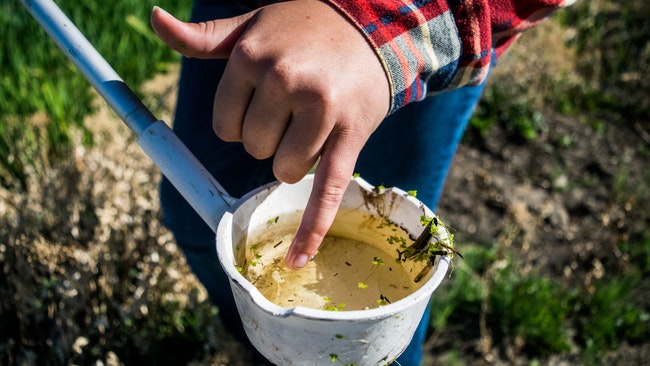 A standing water source is checked for signs of mosquito breeding in a 2020 survey by Malheur County vector control workers. (The Enterprise/file photo)
A standing water source is checked for signs of mosquito breeding in a 2020 survey by Malheur County vector control workers. (The Enterprise/file photo)
VALE – State health officials issued a warning to Malheur County residents Friday to guard against mosquitoes, after a testing site in Vale turned up insects infected with West Nile virus.
The mosquitoes are the first in Oregon this season to be found to carry West Nile, according to a news release from Jonathan Modie, spokesman for the Oregon Health Authority.
West Nile is spread through mosquito bites, so residents are urged to wear long sleeved clothing and use repellents if they spend significant time outdoors, near water sources where the insects may breed.
It is of particular concern for farmworkers and others working in agriculture because of the potential for exposure to standing water. The virus also affects wildlife and farm animals.
Many people who get infected will show scant signs of disease. However, about one in five people infected may develop fever and other symptoms: rash, vomiting, diarrhea and body aches. Fatigue and weakness can last for months. In rare cases, it can cause death.
The incubation period is 2-14 days, Modie said.
Emilio DeBess, a veterinarian in the Health Authority’s Public Health Division, said people can take steps to reduce the risk of mosquito bites and infection.
He offered these tips:
• Eliminate sources of standing water that are a breeding ground for mosquitoes, including watering troughs, bird baths, ornamental ponds, buckets, wading and swimming pools not in use, and old tires.
• When engaged in outdoor activities at dusk and dawn when mosquitoes are most active, protect yourself by using mosquito repellants containing DEET, oil of lemon eucalyptus or Picardin, and follow the directions on the container.
• Wear long-sleeved shirts and long pants in mosquito-infested areas.
• Make sure screen doors and windows are in good repair and fit tightly.
The new cases come after a relatively mild West Nile year in 2020, officials said. The testing looks at “mosquito pools” – samples of about 50 of the insects – and the number of infected pools found suggests the risk for human exposure and infection.
In 2019, the state had nine people reported with the infection, with 85 pools and seven horses testing positive for the virus. In 2018, there were two human cases, 57 positive pools and two horses with West Nile. In 2020, only three pools and one bird tested positive for the virus.
EXCELLENCE IN JOURNALISM – Available for $5 a month. Subscribe to the digital service of the Enterprise and get the very best in local journalism. We report with care, attention to accuracy, and an unwavering devotion to fairness. Get the kind of news you’ve been looking for – day in and day out from the Enterprise.




